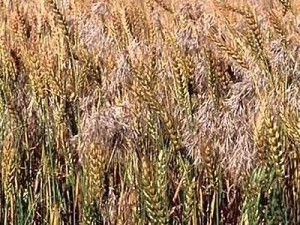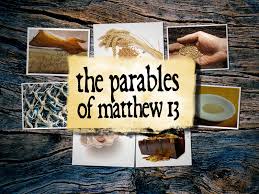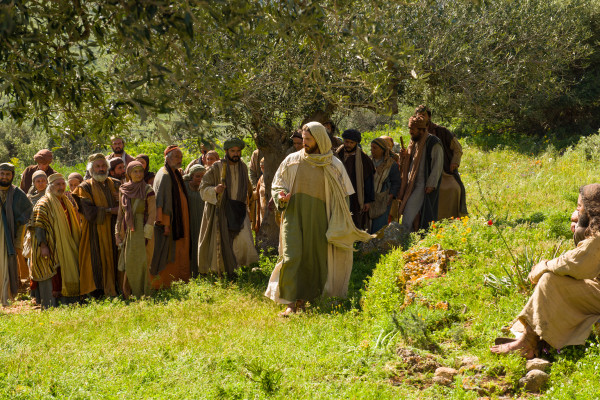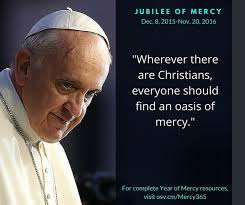
– 23 -7- 2023 –
vs.24 Jesus put another parable before the crowds:
“The kingdom of heaven may be compared to a man who sowed good seed in his field.
vs.25 While everybody was asleep, his enemy came, sowed darnel all among the wheat, and made off.
 vs.26 When the new wheat sprouted and ripened, the darnel appeared as well.
vs.26 When the new wheat sprouted and ripened, the darnel appeared as well.
vs.27 The owner’s servants went to him and said, ‘Sir, was it not good seed that you sowed in your field? If so, where does the darnel come from?’
vs.28 ‘Some enemy has done this’ he answered. And the servants said, ‘Do you want us to go and weed it out?’
vs.29 But he said, ‘No, because when you weed out the darnel you might pull up the wheat with it.
vs.30 Let them both grow till the harvest; and at the harvest time I shall say to the reapers: First collect the darnel and tie it in bundles to be burnt, then gather the wheat into my barn.’”
vs.31 He put another parable before them,
“The kingdom of heaven is like a mustard seed which a man took and sowed in his field.
vs.32 It is the smallest of all seeds, but when it has grown it is the biggest shrub of all and becomes a tree so that the birds of the air come and shelter in its branches.
vs.33 He told them another parable,
“The kingdom of heaven is like the yeast a woman took and mixed in with three measures of flour till it was leavened all through.”
vs.34 In all this Jesus spoke to the crowds in parables; indeed he would never speak to them except in parables.
vs.35 This was to fulfill the prophecy: “I will speak to you in parables and expound things hidden since the foundation of the world.”
vs.36Then, leaving the crowds, he went to the house; and his disciples came to him and said, “Explain the parable about the darnel in the field to us.”
vs.37 He said in reply,
“The sower of the good seed is the Son of Man.
vs.38 The field is the world; the good seed is the subjects of the kingdom; the darnel, the subjects of the evil one;
vs.39 the enemy who sowed them the devil; the harvest is the end of the world; the reapers are the angels.
vs.40 Well then, just as the darnel is gathered and burnt in the fire, so it will be at the end of time.
vs.41 The Son of Man will send his angels and they will gather out of his kingdom all things that provoke offences and all who do evil,
vs.42 and throw them into the blazing furnace, where there will be weeping and grinding of teeth.
vs.43 Then the virtuous will shine like the sun in the kingdom of their Father. Listen, anyone who has ears!”
*******************************************************************
We have four sets of homily notes to choose from. Please scroll down the page for the desired one.
Michel DeVerteuil : A Holy Ghost Priest and Specialist in Lectio Divina
Thomas O’Loughlin: Professor of Historical Theology, University of Nottingham
John Littleton: Director of the Priory Institute , Tallaght, Dublin 24
Donal Neary SJ: Editor of The Sacred Heart Messenger
****************************************
Michel DeVerteuil
Lectio Divina with the Sunday Gospels- Year A
www.columba.ie
General Comments
 We have three more parables this Sunday.
We have three more parables this Sunday.
The first is the parable about the wheat and the darnel in verses 24 to 30, with an interpretation in verses 36 to 43; this is one possible interpretation – feel free to let the parable lead you in other directions. As always when reading a parable, be conscious of the perspective you are coming from: are you identifying with the wheat that a planter allowed to grow although some enemy had sown darnel alongside it? With the man who had the trust to let both grow together? Or with the servants who wanted to pull up the darnel, even though they might pull up the wheat with it? Be conscious also of whether the parable is
– bringing back memories from your past,
– giving you an insight into what is happening to you now,
– or inviting you to trust in the future.
The second parable is about the mustard seed in verses 31 and 32, and
the Third one is about the yeast in verse 33, are on the same general theme, but don’t try to meditate on both together; rather, choose the one that appeals to you now.
Verses 34 and 35 are another summary about parables. Remember with gratitude when you understood one of life’s parables and became aware that what you had learnt was an ancient truth.
Prayer Reflection
Lord, we thank you for those who educated or guided us from youth.
They saw that we had bad traits as well as good ones,
that darnel was mixed in with the good wheat they sowed in us.
There were people who wanted to weed out the darnel
but they said no, lest the wheat be pulled up also:
– if they did not let us mix freely with others, we might no longer be open and generous;
– if we were not allowed to make mistakes, we would never take risks;
– if we did not feel free to ask foolish questions, we would never learn.
We thank you for those who let wheat and darnel grow till harvest time,
and now we have gathered the wheat and can let the darnel be burned.
Lord, forgive us that we write off people as if there is nothing to them but
– their selfishness;
– their insincerity;
– their arrogance.
We forget that they are good seed that you sowed in the world.
The evil in them is only weeds that some enemy sowed while others were asleep.
Those sins which colour our judgement about them will be tied up in bundles and burnt,
while you gather them like precious wheat into your barn.
Lord, we thank you for the church today, our own community and the world-wide church. What a big tree it has become, and so many birds of the air come and shelter in its branches.
We remember that it was once a mustard seed, but people of faith took that seed and sowed it: Jesus, the apostles, the first Christians, the founders of our community.
 We pray today for all those committed to making the world more human:
We pray today for all those committed to making the world more human:
– those who are spreading the spirit of cooperation and community;
– human rights organizations;
– those who uphold the ideal of chastity.
They often feel that the seed they are sowing in the world
is the smallest of all seeds,
but they do it in trust that it will be a big shrub,
and will eventually become a tree
and birds of the air will come and shelter in its branches.
Lord, we thank you for mothers:
– endlessly correcting and reproving,
– repeating the old sayings and proverbs, mixing them into the daily lives of the family,
so that today we recognize that their teaching has touched every part of our society.
*****************************************************
Thomas O’Loughlin
Liturgical Resources for the Year of Matthew
www.columba.ie
Introduction to the Celebration
Use the Asperges option (Holy Water blessing), with this introduction:
Sisters and brothers, today’s gospel reminds us that we, because we are Christians, have to be like a leaven in our society and our world. So let us begin our assembly as the Body of Christ by re-affirming our identity as those who have died in Christ in baptism, and have risen with him to new life and so stand here today.
(If your use a Rite of Penance, then Option c vii (Missal, p 394-5) is appropriate.)
Homily Notes
1. During the Year of Matthew we encounter, Sunday by Sunday, a very large range of parables – as commonly defined – as the gospel readings. The repetition of themes can, therefore, be a problem. One solution would be to select topics from the second readings, but this cannot be done on every occasion without provoking the question: ‘How does the gospel fit with this?’ Sadly, most people cannot appreciate that there is no planned link between the two New Testament readings, no matter how often they are told this. Another solution would be to pick significant topics for preaching, irrespective of the gospel readings. However, apart from this being out of harmony with the logic of the liturgy, and the General Instruction, it also destroys the greatest gift any lectionary confers: it sets a limit to preachers going off on their hobby horses. So preaching, if it is part of the Eucharist and so part of the supreme ecclesial expression of a community of the baptised, must be linked to the readings and, normally, the gospel.
So we need a more sophisticated strategy to provide homilies for the Sundays on which there are parables, which acknowledges the content of the reading, but does not reduce the homily to exegetical notes on particular snippets of text which would be found only of antiquarian value by those members of the community who are not interested in the study of the gospels as such. What follows in these notes, and those of other Sundays (i.e. on Sundays 17, 19, 27, 28, 29, 30, 32), is an attempt to have a preaching strategy that can overarch a wide selection of parable, and parable-like, material.
2. There is a fundamental question that we have to ask ourselves: How do we learn to be Christians?
3. Is that a silly question? Note two specific elements of the form of the question.
First, it is not a question about Christianity, but about people.
Second, it is not a question about an individual engaged in learning, but about a community engage in learning.
4. It is very easy to learn about ‘what we believe‘ or about ‘what the church believes’ or ‘what the church teaches.’ There are umpteen books, catechisms, and classes on this topic. You will find little booklets on it at the back of the church and posters in the porch advertising courses. It is also easy to find out about ‘The Church’. Again, there books on its history, structures, its position as a social force in various societies, it art, customs, architecture, and what not. But all this is learning about something. But Jesus calls us to a new lifestyle, a new way of acting, a new way of life. And one learns how to be and how to live through doing it. Its more like an apprenticeship than a course of studies.
5. The question is how do we learn to be Christians. Most learning is an individual activity, we just happen to do it in a group because there are not enough teachers to go round. So we go to a group evening class to learn French after we have been on a holiday in France. But we worry that our children’s class-sizes are too large. We think of learning as my learning. But how could you learn to play football on your own? To learn to play football requires slowly building up skills through practice and more practice. But while one can practice one or two little moves on one’s own, real practice needs to take place with the team: because it is learning to play together as the team that is the key to success. One cannot say, except as a joke, that ‘I won the game; pity that my team lost!’
 6. We hear about ‘the kingdom‘ in almost every reading from the gospels. We hear about ‘the disciples,’ ‘the apostles,’ and about ‘the followers’, and in almost every reading from St Paul we hear about ‘the church in this or that place’ or’the body of Christ’.
6. We hear about ‘the kingdom‘ in almost every reading from the gospels. We hear about ‘the disciples,’ ‘the apostles,’ and about ‘the followers’, and in almost every reading from St Paul we hear about ‘the church in this or that place’ or’the body of Christ’.
In every case we are talking about the groups: the kingdom is the group who have united themselves with Jesus Christ, are given life by the Holy Spirit, and have come into the Father’s presence. This is the group we pray for when we say’ thy kingdom come’. The kingdom that is just one individual is a joke!
 7. So we have to learn how to be members of this group, the Christians; and we have to learn how to be this new people, how to live this new lifestyle of Jesus. We have to see ourselves as learning by practice, and working with sisters and brothers (that is why we use these terms about one another) to be ‘the kingdom,’ ‘the church,’ ‘the People of God.’
7. So we have to learn how to be members of this group, the Christians; and we have to learn how to be this new people, how to live this new lifestyle of Jesus. We have to see ourselves as learning by practice, and working with sisters and brothers (that is why we use these terms about one another) to be ‘the kingdom,’ ‘the church,’ ‘the People of God.’
8. Today’s gospel gives some insights into the tasks facing the group learning to be Christians.
First, they have to cope with the fact that the group will not be perfect at this stage of its pilgrimage. It would be nice to be part of a perfect group, but it is the actual community that we must work with, learn to act as a group, learn to act with harmony keeping our minds fixed on the lifestyle of generous, peace-making love.
Second, we have to learn to act as a group so that we are like a tiny seed that grows to be a great tree. We must be willing to collaborate to take on the great tasks needed so that the Father’s kingdom grows.
Third, we have to work as a community to transform situations of injustice and suffering. As yeast turns an unappetising mass of starch into joy-giving, living bread, so must our community act within the society. The world must be a better place because of our community.
9. Learning about doctrine is easy; Jesus calls his people to learn to be his people.
****************************************************************
John Littleton
Journeying through the Year of Matthew
www.Columba.ie
Gospel Reflection
During his ministry, Jesus preached that the kingdom of heaven was near. The kingdom of heaven is the reign of God. Jesus used several images when speaking about the kingdom since it is beyond complete description and explanation in human words.
Jesus inaugurated God’s kingdom on this earth. We are already living in the kingdom because the Church is the seed and the beginning of the kingdom. But the Church is not itself the kingdom in all its fullness. The kingdom is a more inclusive reality than the Church of Christ and, similarly, the Church of  Christ is a more inclusive reality than the Catholic Church.
Christ is a more inclusive reality than the Catholic Church.
Many characteristics of the Church of Christ are also to be found outside the Catholic Church and various aspects of the kingdom occur outside the Church of Christ in other religions.This is because the Catholic Church is not identical with either the Church of Christ or the kingdom. The Second Vatican Council (1962-1965) taught that the Church of Christ ‘subsists’ in the Catholic Church.
Jesus and The Kingdom of God, c AD30
This means that, although elements of sanctification and truth also occur outside the visible structures of the Catholic Church and beyond the wider boundaries of the Church of Christ, the fullness of grace and truth are entrusted by Christ to the Catholic Church. Thus there is an inextricable relationship between the Catholic Church, the Church of Christ and the kingdom of God.
The fullness of the kingdom is expected at the end of time. Meanwhile, the Church on earth is on a pilgrimage towards that end. The Church, the People of God, always has members who are sinners. Therefore, while unfailingly holy because Christ is its Head, the Church is constantly in need of purification and renewal. Only at the end of time will the Church on earth achieve fully the perfection to which it is called when the kingdom of God is fulfilled in heaven. Then the Church will be free from all sin.
In that respect, the Church is similar to a field of wheat. The field of wheat ripens slowly, requiring much care and patience from the farmer. Growth may seem undetectable but it occurs as the wheat matures and becomes ready for the harvest. Using the parable of the wheat and the darnel, Jesus teaches two important lessons. First, the Church includes both the good and the bad. Both co-exist. Awareness of God’s reign emerges slowly but surely. Secondly, the good and the bad will be separated at harvest time. Judgement comes at the end.
 The Church and the kingdom of God are absolutely linked. Active participation in the Church’s life and mission prepares us well for judgement at the end of time. The parables about the kingdom challenge us to remain faithful to the Church’s teaching and guidance, reminding us that the Church is the seed and the beginning of the kingdom here on earth. The Church, when it is faithful to its vocation, is the primary means whereby the kingdom is brought about.
The Church and the kingdom of God are absolutely linked. Active participation in the Church’s life and mission prepares us well for judgement at the end of time. The parables about the kingdom challenge us to remain faithful to the Church’s teaching and guidance, reminding us that the Church is the seed and the beginning of the kingdom here on earth. The Church, when it is faithful to its vocation, is the primary means whereby the kingdom is brought about.
For meditation
The sower of the good seed is the Son of Man. ~
The field is the world; the good seed is the subjects of the kingdom;
the darnel, the subjects of the evil one; the enemy who sowed them, the devil;
the harvest is the end of the world; the reapers are the angels. (Mt 13:37-39)
****************************************************************************************
Fr Donal Neary, S.J
Gospel Reflections for the Year of Matthew
www.messenger.ie
Small Beginnings
Everything starts small. The mustard seed was a tiny seed that grew into a flowering bush; it was not mustard as we know it, but only a bush to give beauty and shelter. It can remind us of the beauty of creation, and of the caring shelter we can give to others. It is also a reminder that each of us began as a seed in the mother’s body, and grew with the plan of God. The love of God grows like that – it begins small with birth and with baptism, and then grows wide so that we share our love of God. It is the same with marriage – love begins and then grows so that children and grandchildren and others may shelter in love. Love grows when love is given, in our immediate circle, and in our care for the wider world. Good friendship and love spreads out to many.
 We want the kingdom of God on earth and God is saying that it grows slowly. It grows as we try to grow love, peace, justice and compassion. The shelter of the mustard bush is the mercy of God, encouraging our parish to be ‘an oasis of mercy‘ (Pope Francis). It is not easy, as love and care for the really needy often meets with opposition. The kingdom of God grows with the help of God, and without this help, our efforts are in vain.
We want the kingdom of God on earth and God is saying that it grows slowly. It grows as we try to grow love, peace, justice and compassion. The shelter of the mustard bush is the mercy of God, encouraging our parish to be ‘an oasis of mercy‘ (Pope Francis). It is not easy, as love and care for the really needy often meets with opposition. The kingdom of God grows with the help of God, and without this help, our efforts are in vain.
Recall something in your life that began small
and has now grown; give thanks
Lord, may your kingdom come among us.
***********************